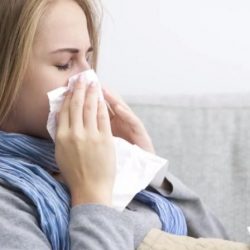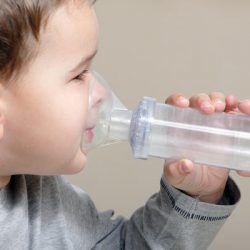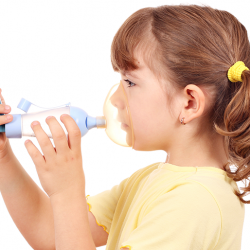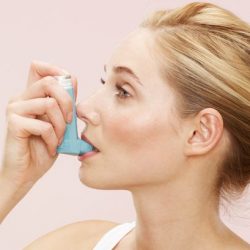For years, scientists have been trying to come up with a better way to protect people against tuberculosis, the disease caused by infection with the Mycobacterium tuberculosis (Mtb) bacteria. Texas Biomedical Research Institute Professor Jordi Torrelles, Ph.D., says new hope is on the horizon after a recent experiment performed in mice showed great promise. The study was … [Read more...]
Asthma & Allergies

Scientists Identify Unique Subtype Of Eczema Linked To Food Allergy
Children with atopic dermatitis develop patches of dry, itchy, scaly skin caused by allergic inflammation. Atopic dermatitis symptoms range from minor itchiness to extreme discomfort that can disrupt a child's sleep and can lead to recurrent infections in scratched, broken skin. The study, led by Donald Y.M. Leung, M.D., Ph.D., of National Jewish Health in Denver, examined … [Read more...]
Peanut Allergy Prevention Strategy Is Nutritionally Safe
Introducing peanut-containing foods during infancy as a peanut allergy prevention strategy does not compromise the duration of breastfeeding or affect children’s growth and nutritional intakes, new findings show. The work, funded by the National Institute of Allergy and Infectious Diseases (NIAID), part of the National Institutes of Health, is published online on June 10 in the … [Read more...]
Pregnant women and new moms still hesitant to introduce peanut products
In January 2017 guidelines were released urging parents to begin early introduction of peanut-containing foods to reduce the risk of peanut allergy. A new study shows those who are aware of the guidelines are still hesitant to put them into place and not everyone has heard of them. The study, published in Annals of Allergy, Asthma and Immunology, the scientific journal of … [Read more...]
New Rx for allergic contact dermatitis
Research led by Nicolas Bazan, MD, PhD, Boyd Professor and Director of the Neuroscience Center of Excellence at LSU Health New Orleans School of Medicine, has found a promising new treatment for allergic contact dermatitis that offers an alternative to corticosteroids and their possible side effects. The research is published this month in Dermatology and Therapy, available … [Read more...]
Guidelines say no special precautions needed for flu shots for people allergic to eggs
No greater risk of reaction than for those without an allergy For years, people with an egg allergy have been told to avoid or take special precautions when getting a flu shot because most influenza vaccines are grown in eggs and contain a tiny amount of egg protein. An updated practice parameter from the Joint Task Force on Practice Parameters stresses that people with egg … [Read more...]
Here’s how stress may be making you sick
A Michigan State University researcher is providing new insight into how certain types of stress interact with immune cells and can regulate how these cells respond to allergens, ultimately causing physical symptoms and disease. The federally funded study, published in the Journal of Leukocyte Biology, showed how a stress receptor, known as corticotropin-releasing factor, or … [Read more...]
Proteins in breastmilk protect offspring against food allergy
Research published in the Journal of Experimental Medicine indicates that a mother's diet can protect nursing newborns against food allergies. Conducted by researchers at Boston Children's Hospital and Harvard Medical School, the study offers an explanation for how breastfeeding can promote tolerance to the foods that most often cause allergies. The study received support from … [Read more...]
Polyunsaturated fatty acids linked to reduced allergy risk
New research from Karolinska Institutet in Sweden reveals that high levels of polyunsaturated fatty acids in children's blood are associated with a reduced risk of asthma or rhinitis at the age of 16 years. The study is published in The Journal of Allergy and Clinical Immunology. Allergic diseases such as asthma and rhinitis are common and often debut in childhood. … [Read more...]
Exposure to pet and pest allergens during infancy linked to reduced asthma risk
Children exposed to high indoor levels of pet or pest allergens during infancy have a lower risk of developing asthma by 7 years of age, new research supported by the National Institutes of Health reveals. The findings, published September 19 in the Journal of Allergy and Clinical Immunology, may provide clues for the design of strategies to prevent asthma from … [Read more...]
What pediatricians tell parents about early peanut introduction to prevent allergy
Guidelines to help parents introduce peanut-containing products to infants to prevent peanut allergies aren't being discussed. New research presented at the American College of Allergy, Asthma and Immunology (ACAAI) Annual Scientific Meeting shows pediatricians are not only not having the discussion, they're not referring high-risk babies for testing prior to peanut … [Read more...]
Effective treatment of contact allergy
Researchers have isolated a molecule that is suitable for the control of contact allergies. The study illuminates a central immune mechanism, which may also play a role in other inflammatory diseases such as arthritis or arteriosclerosis. ]The newly discovered substance is a so-called RNA aptamer. Aptamers are molecules that are related to DNA, the carrier of the genetic … [Read more...]
Sugar intake during pregnancy is associated with allergy and asthma in children
High maternal sugar intake during pregnancy may increase the risk of allergy and allergic asthma in the offspring, according to an early study led by Queen Mary University of London (QMUL) involving almost 9,000 mother-child pairs. While some research has reported an association between a high consumption of sugar-containing beverages and asthma in children, the relation … [Read more...]
New clues found to common respiratory virus
HIV-positive women with cytomegalovirus, or CMV, in their urine at the time of labor and delivery are more than five times likelier than HIV-positive women without CMV to transmit HIV, the virus that causes AIDS, to their infants, according to a UCLA-led study. The research also found that they are nearly 30 times likelier to transmit cytomegalovirus to their … [Read more...]
Larger doses of vitamin C may lead to a greater reduction in common cold duration
The relationship between vitamin C dosage and its effects on the duration of the common cold symptoms may extend to 6-8 grams per day. Dozens of animal studies using different animal species have found that vitamin C significantly prevents and alleviates infections caused by diverse bacteria, viruses, and protozoa. Given the universal nature of the effect of vitamin C … [Read more...]
Women with unhealthy BMIs who smoke, drink at two-fold higher risk of asthma
Underweight and obese women who also drank alcohol and smoked tobacco had a two-fold higher risk of being diagnosed with asthma than women with a healthy body mass index who did not drink or smoke, a St. Michael's Hospital study found. Women with low and high body mass indexes, or BMIs, who smoked and drank were also two to three times more likely to experience … [Read more...]
Asthma is associated with polycystic ovary syndrome and excess weight
Among reproductive-age women, polycystic ovary syndrome (PCOS) as well as overweight and obesity are independently linked with asthma, new preliminary research from Australia suggests. "A greater proportion of women with polycystic ovary syndrome report asthma, and the results of this study suggest that asthma is associated with PCOS and excess weight," said lead author … [Read more...]
Smoking while pregnant may compromise children’s kidney function
In a new study, young children showed signs of kidney damage if their mothers smoked while pregnant. The findings, which appear in an upcoming issue of the Clinical Journal of the American Society of Nephrology (CJASN), add to the list of negative health effects that can result from maternal smoking during pregnancy. Because smoking is a well-known risk factor for … [Read more...]
More frequent vaping among teens linked to higher risk of heavy cigarette smoking
In a study appearing in the November 8 issue of JAMA, Adam M. Leventhal, Ph.D., of the University of Southern California Keck School of Medicine, Los Angeles, and colleagues examined associations of e-cigarette vaping with subsequent smoking frequency and heavy smoking among adolescents. E-cigarette vaping is reported by 37 percent of U.S. 10th-grade adolescents and is … [Read more...]
Intestinal diversity can prevent asthma
Children who develop asthma or allergies have an altered immune response to intestinal bacteria in the mucous membranes even when infants, according to a new study from Linköping University, Sweden, and Center for Advanced Research in Public Health, Spain. The results also suggests that the mother's immune defence plays a role in the development of asthma and allergies in … [Read more...]
How Close Can You Get With Food Allergy Triggers?
Allergists realize people who are severely allergic to a food can experience great anxiety when encountering the food in any form. Kids, in particular, can get extremely nervous about the idea of being close to someone eating peanuts or peanut butter. An article in Annals of Allergy, Asthma and Immunology, the scientific publication of the American College of Allergy, … [Read more...]
Breastfeeding Can Help Infants Battle The Risk Of Asthma
Infants who have a genetic profile linked with asthma risk could be protected against respiratory symptoms if they are breastfeed, according to a new study. "Our study is the first to show that breastfeeding can modify the effect of asthma-related genetic profiles on respiratory symptoms in the first year of life," commented Dr Olga Gorlanova, from the University … [Read more...]
Asthma Risk Increases When Child Has Bronchiolitis
Results of a study published in PLOS ONE show that asthma risk increased 17 times when children who had bronchiolitis in the first two years of life also had a common variation of the Plasminogen activator inhibitor-1 (PAI-1) gene. Similarly, children with this genetic variation were 12 times more likely to develop asthma after any lower respiratory tract infections requiring … [Read more...]
Stem Cell Therapies For Lung Disease On The Rise
Researchers say "stem cell medical tourism" is becoming a global problem -- preying on desperate patients with incurable diseases. Stem cell medical tourism and unproven stem cell interventions are growing and concerning issues for patients afflicted with lung disease. According to Boston University School of Medicine (BUSM) researchers, there are an increasing number of … [Read more...]
Game-Changer Asthma Pill Could Be The Ultimate Cure!
"This new drug could be a game changer for future treatment of asthma" -- Professor Chris Brightling, NIHR Senior Research Fellow at the University of Leicester The first new asthma pill for nearly 20 years has the power to significantly reduce the severity of the condition, a study led by the University of Leicester has found. The research was funded by Novartis … [Read more...]
Do You Have Wheat Sensitivity?
A new study may explain why people who do not have celiac disease or wheat allergy nevertheless experience a variety of gastrointestinal and extra-intestinal symptoms after ingesting wheat and related cereals. The findings suggest that these individuals have a weakened intestinal barrier, which leads to a body-wide inflammatory immune response. Findings from the study, … [Read more...]
Eczema: Risks & Benefits of Frequent Bathing
If you have a child with newly-diagnosed eczema, you may be wondering how often you should bathe him. You are not alone. For more than 100 years, doctors have been asked about the risks and benefits of frequent bathing for those with atopic dermatitis (eczema). And parents haven't gotten consistent responses. A new article in Annals of Allergy, Asthma and Immunology, … [Read more...]
Air pollution linked to increased rate of kidney disease
While air pollution is known to cause respiratory and cardiovascular diseases, a new study indicates that it also likely causes damage to the kidneys. The findings, which appear in an upcoming issue of the Journal of the American Society of Nephrology (JASN), call for attention on the role of air pollution in the development of kidney disease in urban areas. Air … [Read more...]
Allergy Drops Bring Relief
Millions of Americans suffer throughout spring and summer when allergies are in full bloom, and for many people, that means loading up on over-the-counter allergy drugs. But, new ways to make an established therapy may spell long-lasting relief. This used to be the season of agony … not ecstasy for Tina Falvey. She couldn’t even enjoy a simple, easy breath. But for this … [Read more...]
Deployment-related respiratory symptoms in returning veterans: A Study
In a new study of the causes underlying respiratory symptoms in military personnel returning from duty in Iraq and Afghanistan, a large percentage of veterans had non-specific symptoms that did not lead to a specific clinical diagnosis. Most patients who did receive a diagnosis had evidence of asthma or nonspecific airway hyperreactivity, which may have been due in some cases … [Read more...]
- « Previous Page
- 1
- 2
- 3
- 4
- …
- 14
- Next Page »





























